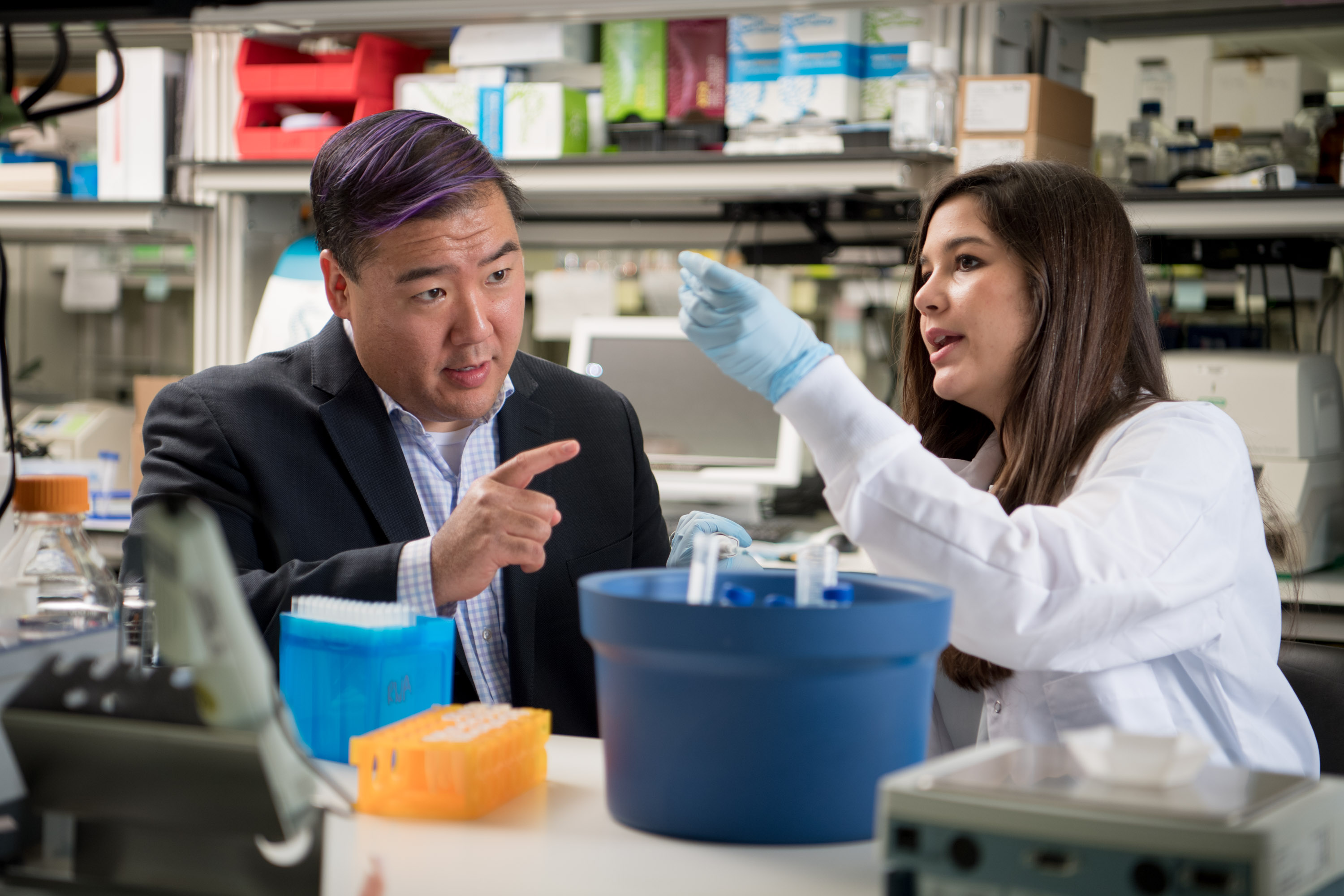GSBS PhD student Carolina García García publishes paper in Gastroenterology; gives advice to first authors
March 09, 2022 By: Emily Rech/MD Anderson UTHealth Graduate School

Preclinical research on hypoxia-inducible factors (HIF1 and HIF2) led by Cancer Biology PhD student Carolina García García, her advisor and GSBS faculty member Cullen Taniguchi, MD, PhD, and MD Anderson’s Yanqing Huang, PhD, and Natividad Fuentes, PhD, found that loss of stromal HIF2 delayed progression of pancreatic cancer. Their findings on suppressing HIF2 to improve immunotherapy response in pancreatic cancer have been published in Gastroenterology.
In addition to her GSBS faculty members, García García was helped by GSBS students Maria Monberg and Emily G. Caggiano from the Cancer Biology program as well as Vincent Bernard, MD, PhD, a GSBS alum. In the article titled, “Stromal HIF2 regulates immune suppression in the pancreatic cancer microenvironment,” García García explores HIF2 as a potential therapeutic target to enhance immunotherapy in pancreatic cancer by using a class of FDA approved inhibitors to block HIF2 activity.
Pancreatic cancer is infamous for being one of the harder cancers to treat. This is because pancreatic cancer resides within a dense network of scar-like tissue called stroma that shields the cancer from chemotherapy and immunotherapy. In this low-oxygen environment, HIF1 and HIF2 stabilize and are thought to cause aggressive cancer growth within the pancreas. The research team found that stromal HIF2 is an essential component of pancreatic cancer pathobiology and is a druggable therapeutic target (with a class of HIF2 inhibitors recently being FDA-approved) that could be repurposed to enhance response to immunotherapy in this disease.
In analyzing her research, García García found herself wanting to explore many different avenues that her data could potentially address. However, she advises first authors going through the same process to maintain a “laser focus” when writing and working on their papers. “There will always be new hypotheses to test, additional experiments to do, and more questions to answer—that’s the beautiful thing about science. It took some reflection to realize these are great questions for future study, but for right now, whatever is not in the lines of ‘paper submitted’ to ‘paper published’ is a distraction.”
García García also credits organization and emulation as part of her success. She recommends starting early with organizing data, compiling thoughts, and being aware of deadlines. Remember that you will be working with this data for a long time, so having everything organized in a way that makes sense to you will save you an inordinate amount of time while you do revisions.
She also spent time reading through the issues of journals she aspired to be published in, and emulated the concise structure and figure styles she noted so often within their pages into her own paper. “You want the editors of the journal to look at your manuscript and think ‘this belongs here.’”
The GSBS staff, faculty, and students have been such a great encouragement to García García and her studies. “Everyone at the GSBS is nice to me, open to helping me, and even knows me by name. It’s so rare that with such a big school and so many students, people still know each other.” Graduate school is objectively hard, but the amount of support she receives from her peers and mentors counteracts any self-doubt she may face in the moment.
Another piece of valuable advice she has for students just starting off in their labs is to embrace the people with which you work. In the years that García García has worked in her lab, she has formed a sort of family with her lab mates. You all have the same love of science, and you are all working towards a common goal—that is automatic common ground to form a support group around. Your peers celebrate with you during a win, and commiserate during a loss. The members of her lab often meet outside of the lab, coming together to bond as friends. García García even flexed her cooking muscles to make beef lasagna from scratch for their most recent meetup (and eggplant lasagna for the vegetarians of the lab).
Getting her study published in Gastroenterology has been such an exciting development for García García, her lab, and the GSBS. “We are excited to share our discoveries and hopeful that they will have a positive impact in our field and in patients down the line. Our work addresses a long-standing knowledge gap about the relative roles of hypoxia signaling in the pancreatic tumor microenvironment. I am excited for new opportunities that will come with publishing in this journal.”
Read García García’s research in Gastroenterology.
Some of the information for this story came from an MD Anderson media release. Photos used in this story were taken before the pandemic.








